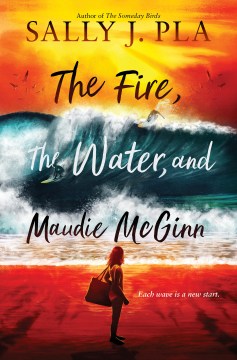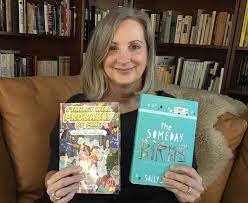 For those of you who are regular Mixed-Up Files readers, you know that I LOVE to do author interviews. So, you can only imagine how thrilled I was to have the good fortune to chat with one of my favorite authors—and favorite author friends—Sally J. Pla!
For those of you who are regular Mixed-Up Files readers, you know that I LOVE to do author interviews. So, you can only imagine how thrilled I was to have the good fortune to chat with one of my favorite authors—and favorite author friends—Sally J. Pla!
Sally, who wrote the best-selling MG novels The Someday Birds and Stanley Will Probably Be Fine, is also the author of a picture book, Benji, the Bad Day, and Me. Her latest MG novel, The Fire, The Water, and Maudie McGinn, is out tomorrow, July 11, from Quill Tree Books.
A Summary of Maudie McGinn
Neurodivergent Maudie always looks forward to the summers she spends in California with her dad. But this year, she must keep a troubling secret about her home life—one that her mom warned her never to tell. Maudie wants to confide in her dad about her stepdad’s anger, but she’s scared.
When a wildfire strikes, Maudie and her dad are forced to evacuate to the beach town where he grew up. It’s another turbulent wave of change. But now, every morning, from their camper, Maudie can see surfers bobbing in the water. She desperately wants to learn, but could she ever be brave enough?
As Maudie navigates unfamiliar waters, she makes friends—and her autism no longer feels like the big deal her mom makes it out to be. But her secret is still threatening to sink her. Will Maudie find the strength to reveal the awful truth—and maybe even find some way to stay with Dad—before summer is over?
Interview with Sally J. Pla

MR: Sally! I’m jumping up and down with excitement to welcome you to the Mixed-Up Files. Thanks for stopping by, my friend!
SJP: I’m jumping up and down with excitement to be here! I love Mixed-Up Files! And you!
MR: First, you already know how much I loved The Fire, The Water, and Maudie McGinn. I laughed, I cried, and I rooted for Maudie from beginning to end. What was the inspiration behind this wonderful book?
SJP: Thank you so much for those kind words! In terms of inspiration, I guess you could say that for this book, the setting was the first character. Maudie’s story is set in an RV campground by the beach, in a fictional town in San Diego County. I live in this county, not too far from the beach, and there’s an actual RV campground that I often meander through during beach walks.
Something about the place is so appealing. Lawn chairs pulled up to fire pits, folks chatting, kids whizzing around on skateboards, surfers making their way up and down the cliff steps with their boards. The supply store, the rangers’ office, the snack bar—it’s a whole little world. So, as I walked, I started to weave a narrative in my head about a young girl who lived in a fictionalized beachside campground. What would be her story? And what could have brought her there?
All About Maudie

MR: The protagonist Maudie, who is autodivergent, is a kind, lovable, and highly relatable character. How were you like Maudie as a child? How were you different?
SJP: Maudie has many of my childhood behaviors, quirks, and challenges. She dislikes change. She has shy attacks– i.e., going mute when overwhelmed, just as I did. She loves simple, comfortable clothing. She is incredibly empathetic, caring, and sensitive. Nothing about her is too girly or precious. Maudie is willing to be brave, though, and she wants to delve into life; to join in, to try new things. These are all ways we are similar.
As for differences: Maudie’s mom and dad were struggling teen parents who split, and now she has a difficult stepdad situation. This is not my family history. Although, like Maudie, I did experience emotional and physical abuse in my formative years.
The Future is Female

MR: As a follow-up, Maudie McGinn is your first MG novel to feature a female protagonist. What made you decide to switch it up?
SJP: I have three boys. Between them and all their friends hanging out, I used to joke that the testosterone in my house was giving me facial hair! Because I lived in boy-world for a long time, it naturally filtered into my writing choices. But now they are grown, I am turning to my own personal stories and experiences. It’s time to write for GIRLS.
Autistic girls are diagnosed at a rate four times less than boys. They fly under the radar, because their behaviors can be more subtle. Part of why I write is that I want to shine a spotlight on this.
Poisonous Secrets
MR: An important theme in the novel is secret keeping, when Maudie’s mom makes Maudie promise not to tell anyone about the abuse she’s suffering at the hands of her stepfather, Ron. What were you trying to say about secret keeping—and secrets in general?
SJP: That sometimes, secrets are poison. They corrode your sense of self, your self-esteem. Certain secrets are intricately connected to shame. And you can’t really heal yourself from the damage they do, until you find the power within yourself to show them the sunlight. Speak them aloud. I feel so strongly that we need to learn to air certain secrets, if we ever plan to heal from them.
Maudie’s mother puts Maudie in a dire situation by making her promise to keep her new stepdad’s anger attacks upon Maudie a secret. It compounds the abuse. And Maudie has trouble speaking, in general—so how does she find her way through this dilemma?
Fact: Autistic (or otherwise neurodivergent) and disabled children are three times more likely to experience abuse than their normal-presenting peers. Quite frankly, they are more likely to frustrate a caregiver or parent. And they are less likely to be believed or listened to, after the fact.
Hang Ten

MR: Maudie wants to learn how to surf, so she takes lessons from former pro surfer Etta Kahana. Unless I’m mistaken, Sally, you’re not a surfer yourself. How did you make the surfing scenes so realistic? What kind of research did you do?
SJP: Many of my family members are surfers. And where I live, a lot of it is just in the air. I also have surfing-enthusiast friends—most notably, my pal Janet Berend, lifelong surfer, author, and teacher. She read the whole manuscript for me to check it for surf-accuracy, and I’m forever indebted to her. (Any mistakes are my own!)
I do not surf, but when I was younger, I used to love to windsurf. I still have my old Mistral board. Nowadays, though, all I do is swim. And I deeply enjoy being surrounded by all that beautiful, watery blue.
Literary Leanings

MR: Maudie McGinn is a wonderful hybrid of prose and verse. What made you choose this particular literary form for your novel?
SJP: Maudie has a glitch: She has some auditory processing delays. Auditory processing (listening-understanding-responding within typical speed parameters) is a challenge for some autistic people. It was for me when I was very young.
So, words come to Maudie, and leave her lips, at a halting pace sometimes. Verse is perfect for this. I found myself writing verse for her without even realizing it. Verse format reflects how she sometimes thinks: in slow, considered, spare, fragments.
Path to Publication

MR: What was the path to publication like with Maudie McGinn? To use a surfing analogy, was it a smooth ride or did you wipe out once in a while?
SJP: Ha ha, great analogy! Publishing IS like surfing: a ridiculous and unpredictable combination of skill, timing, and luck. Lord knows, I’ve messed up that combination often enough in the past, but Maudie was more or less of a smooth ride. I wrote it during Covid, so there were big waves of emotion involved. But the writing flowed.
I’m so grateful to be at Quill Tree Books, an imprint of HarperCollins, that raises up underrepresented voices. Quill Tree’s slogan is: “Many branches, many voices,” and I love that.
No World Too Big

MR: You have a poem in the MG poetry anthology, No World Too Big: Young People Fighting Global Climate Change. Can you tell us about this project? How did you get involved, and why?
SJP: I was super honored to be asked to write the poem for Greta Thunberg, as she is one of my absolute heroes! Talk about an autistic girl with courage and grit! It’s such an inspiring anthology, with gorgeous illustrations by Jeanette Bradley. Editors Lindsay Metcalf and Keila Dawson were a joy to work with! And there is no more important issue affecting our next generation—affecting all of us—than climate crisis.
(For more information on the impacts of our changing climate, check out this STEMTuesday interview with author Christy Mihaly.)
Write This Way…

MR: What does your writing routine look like, Sally? Do you have any particular writing rituals?
SJP: I have insomnia, and sometimes do my best work sitting up in bed in the wee hours. That is a HORRIBLE method, however, and I do not recommend it unless you enjoy feeling dopey and groggy all day. Otherwise, I try to be an early bird. Hot tea. Quiet. A comfy armchair. Oh, and ‘Freedom’ blocking software on my laptop, to keep me from wandering away into every rabbit hole in the cyberwilderness.
A Novel Mind

MR: In addition to being an acclaimed children’s book author, you run anovelmind.com, a site about mental health and neurodiversity in children’s literature. Can you tell MUF readers a bit about it? What was the impetus behind starting this site?
SJP: Thank you for mentioning A Novel Mind! I cofounded it a few years ago with my friend, neurodivergent author/licensed therapist Merriam Saunders.
It grew out of our many, many complaining conversations, bemoaning how hard it was to find stories with quality, authentic autism/ADHD/disability/mental health representation. The stories that didn’t “other” or “pathologize” the neurodivergent kid, or use them for the purpose of what’s called “inspiration porn.” The stories that just showed neurodivergent or otherwise challenged kids going about their lives naturally, and having adventures, etc. Because these stories help show kids their power. They are great touchstones to classroom conversations. They grow empathy. They heal.
We have well over 1,000 such books in our searchable database now. And there are Educator Resource pages on the site with tons of informative links, curated by amazing autistic librarian Adriana White and myself. There are close to 200 guest posts on our weekly blog, now, written by some of today’s foremost award-winning children’s authors, and educators and other professionals. In sum: it’s a great resource, and a labor of love. I hope Mixed-Up Files readers will check it out!
MR: What are you working on now? Enquiring Mixed-Up Files readers want to know.
SJP: A dual point-of-view Romeo+Juliet retelling, set against the background of a simmering family feud, in a small farming town in the upper Midwest, in the early days of the culture wars. Upper middle-grade!
Lightning Round!

MR: And finally, no MUF interview is complete without a lightning round, so…
Preferred writing snack? Roasted almonds.
Coffee or tea? I love the smell of coffee but sadly can’t drink it! I’m “English Breakfast” all the way!
Cat or dog? Big goofy dogs are my total weakness.

Favorite beach? I grew up on Southport Beach, in Connecticut. It’s the setting of so many memories: big nostalgia! But now I live by, and love, Moonlight Beach, Swami’s, Cardiff Beach, Del Mar dog beach, La Jolla Shores–all my favorite San Diego sandy spots.
Zombie apocalypse: Yea or nay? No apocalypses of any kind for me, thank you very much!
Superpower? To not feel sensory overwhelm, fear, or anxiety anymore would be a superpower enough. But if we’re being truly aspirational: SuperWorldPeaceMaker!
Favorite place on earth? The chair in my living room that looks out over a beautiful canyon and soaring hills, and it’s so peaceful, all you hear are birds.
If you were stranded on a desert island with only three things, what would they be? A deluxe resort! Great friends! Good weather! Ha ha.

MR: Thank you for chatting with us, Sally—and congratulations on the publication of The Fire, The Water, and Maudie McGinn. I thoroughly enjoyed it, and I know MUF readers will too!
SJP: Thank you so much, Melissa! This is my most personal and heart-felt book yet, and I hope everyone who reads it, falls in love with Maudie a little bit. Then I’ll feel as if I’ve done my job.
Bio

Sally J. Pla is the award-winning author of acclaimed middle-grade novels THE SOMEDAY BIRDS and STANLEY WILL PROBABLY BE FINE, and the picture book, BENJI, THE BAD DAY, AND ME. Her books are Junior Library Guild Selections with starred reviews that have appeared on many awards lists and “best books” roundups. Her latest middle-grade novel, THE FIRE, THE WATER, AND MAUDIE McGINN, pubs on July 11, 2023 (Quill Tree/HarperCollins).
Sally has appeared on television and radio as an author and autism advocate, and she runs the website resource A Novel Mind (anovelmind.com). Learn more about Sally on her website and follow her on Twitter and Instagram.





 Are You There God? It’s Me, Margaret was the first book I bought with my own money. Later, Judy signed it for me at a meet-and-greet at Eeyore’s, the iconic and sadly, now defunct children’s bookstore on the Upper West Side of Manhattan.
Are You There God? It’s Me, Margaret was the first book I bought with my own money. Later, Judy signed it for me at a meet-and-greet at Eeyore’s, the iconic and sadly, now defunct children’s bookstore on the Upper West Side of Manhattan.




 “I saw the movie with a group of friends, and we agreed it felt like a surreal trippy visit to the 1970s that felt faithful to the book. I had completely forgotten about the religious exploration part of the book, which reminded me how much that resonated with my young self. I grew up in a very small, very Christian town and I was a weirdo transplant from New York City who was raised in a non-religious household.
“I saw the movie with a group of friends, and we agreed it felt like a surreal trippy visit to the 1970s that felt faithful to the book. I had completely forgotten about the religious exploration part of the book, which reminded me how much that resonated with my young self. I grew up in a very small, very Christian town and I was a weirdo transplant from New York City who was raised in a non-religious household.











